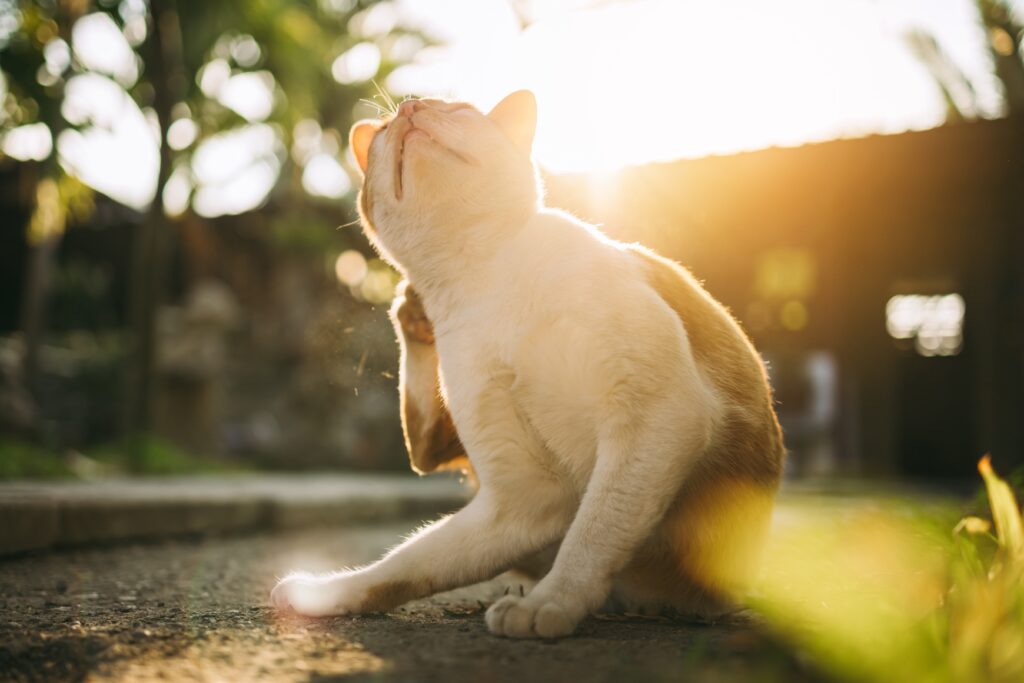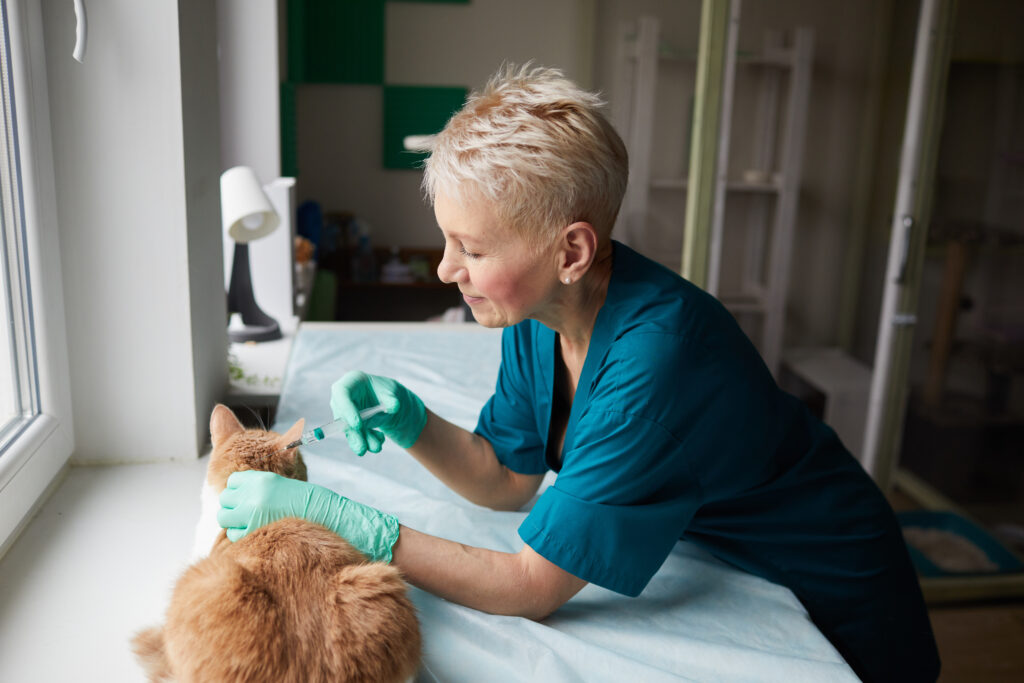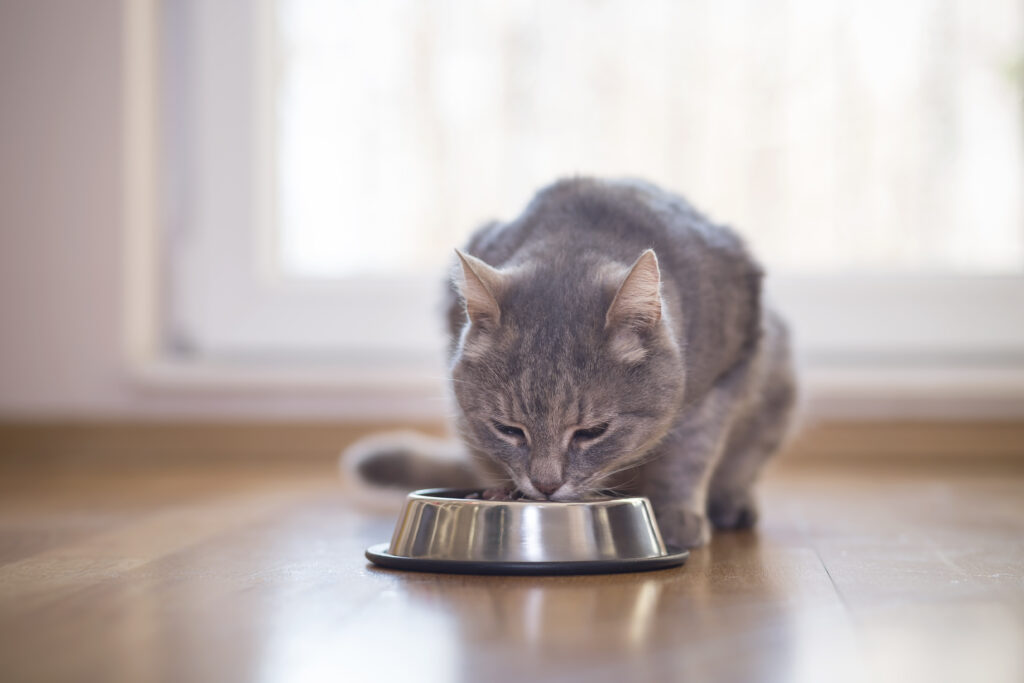
Did you know that cats can get dandruff too? Just like humans, their skin can become dry and flake when petted. While it's usually not a symptom, figure out the root cause to provide the best treatment. In most cases, helping your cat skin dryness takes a few easy steps.
Cats' dry skin can be a sign of dietary deficiencies. Omega-3 fatty acids and zinc are necessary for a balanced diet that will help maintain healthy skin and coat.
Dry skin may factor in due to an overweight cat or mobility problems that prevent adequate grooming. It can lead to hair matting, inflammation, and flaking. Regular exercise and nutritionally balanced meals can help prevent this.

Is your cat's fur lackluster? Are you seeing white flakes in their coat? These could be signs of dry skin. Other symptoms include excessive scratching and a lack of shine to the fur.
Does your cat have an itch it can't seem to scratch? Dry skin could be the culprit! Itchy, inflamed skin is a common symptom and can often link to dermatitis.
On top of this, cats suffer from dry skin and often show signs of dandruff - small white flakes in their fur. While usually not serious, if you see this in combination with other symptoms, a bigger underlying problem might be at hand.
If you observe your pet scratching itself frequently, it may be experiencing some irritation from its skin. It can manifest as a patchy coat or baldness, so keep an eye out for any significant changes to the texture and appearance of your pet's fur.
It is important to note that if your cat is continuously licking at its skin, the problem might be more severe than dryness - ask your vet if you notice particularly concerning behavior.
Cat skin dryness can indicate something else - allergies, infections, and parasites can all contribute to flakiness, itching, and unkempt fur. You may also notice your cat self-grooming more often than usual. The key to helping your pet is to identify the underlying cause of the dry skin and provide appropriate treatment.
In colder months, the dry air of a heated environment can lead to dehydration. During the summer, sensitive skin may become dried out when exposed to air conditioning machines. Furthermore, cigarette smoke, fragrances, and household chemicals may influence your cat's uncomfortable skin condition.
Use humidifiers throughout the house to increase the overall humidity levels. Keeping your cat well hydrated is also essential for internal hydration and will support a healthy coat.
When bath time rolls around, choose shampoos and conditioners that are specially formulated for cats and designed to be moisturizing. It can aid in combating dry, itchy skin.
Excessive skin and hair buildup on the coat can cause dry, unhealthy skin. Cats with limited mobility, such as arthritis or obesity, can’t groom themselves properly.
Regular brushing may prevent excess fur from accumulating and trapping moisture close to the cat's skin.
If your cat's inability to groom is related to obesity, consult your veterinarian about crafting a plan that helps them lose excess weight. Taking this step not only allows them to groom themselves better but will overall benefit their health.
When the problem is due to arthritis or any other medical condition, your vet will devise a treatment plan tailored to that specific case and may also provide medication for pain management.
Excessive grooming can also lead to dry skin and hair loss. Cats generally itch or feel uncomfortable when over-grooming to reduce the sensation.
Cats don't need regular baths - unless they are dirty or have a skin issue. While occasional bathing with a cat-safe shampoo may be alright, frequent baths can lead their skin to become dry.
Treatment
The ideal way to treat dry skin caused by frequent bathing is to reduce the frequency of baths. If your cat has a medical condition that hinders their grooming process, speak to your veterinarian about what bathing routine will suit them without making their skin and coat oil-deficient.
Home-prepared diets may be well-intentioned but don’t provide balanced and complete nutrition. Even commercial food products could prove ill-suited for some cats. Generally, cats do best on moist foods high in protein and low in carbohydrates.
Introduce a high-quality, well-balanced diet. Consult with your veterinarian concerning the best quality commercial foods for your cat. If they lack nutrients, it's advisable to have them assessed and get your vet's advice on the correct meals.
Parasites:
External parasites like fleas or mites on the skin may cause the skin to develop a dry, flaky appearance. In some cases, fleas and flea dirt are visible to the naked eye, but fastidious cats may remove evidence of fleas while grooming. Most mites aren’t evident. Cheyletiella mites are an exception and are often called "walking dandruff."
Allergen exposure can prompt a cat's immune system to respond in the form of itchy, inflamed, and dry skin. Possible allergens include pollen, dust mites, food, chemicals, and fragrances.
Bacterial and fungal infections are common contributors to this issue, and if left untreated, the condition may worsen over time.
Treatment for a cat's skin disease will depend on whether it is bacterial or fungal. Antibiotics are prescribed for bacterial infections, while the antifungal medication is the go-to for fungal ones. These medications can be taken orally or applied topically.
Systemic diseases, hyperthyroidism, diabetes, kidney disease, or heart disease can cause skin issues. For some, it may directly affect the skin's appearance. Even when this is not the case, cats that suffer from these conditions might not be able to groom themselves properly, leading to a dry, flaky complexion.
A veterinarian must diagnose and evaluate before determining the most suitable treatment option for hyperthyroidism in an individual cat. Various treatments are available, including medications, radioactive iodine therapy, surgical procedures, and dietary adjustments.
Seeking help leads to a good prognosis. Otherwise, health complications may arise.
Stress also affects the skin and coat of cats, just as it does on humans. Various situations can be distressing, such as moving to a new home, welcoming a new family member or pet into their environment, noise from outside the house or other events, and sickness.

After reading through the causes of cat skin dryness, it’s your turn to attend to your cat. Casual grooming sessions to examine their fur are encouraged, but remember that overdoing it can lead to much more discomfort and dryness.
As a pet parent, learn the health hazards your feline friend could experience. Doing so will help prevent or prepare you for addressing the underlying issue.
Do Cats Need Baths? Read here.
Our cosmetic skin conditioner and moisturizer promote animal health through its Zinc-Copper-Magnesium concentrated formula. Your pets will look and feel their best with AniViva! View our products here.



